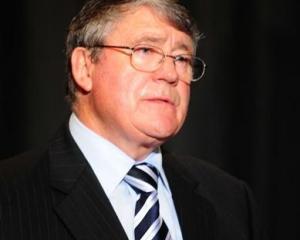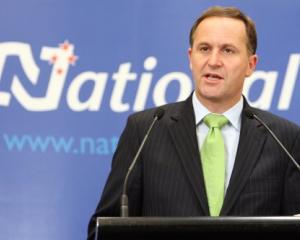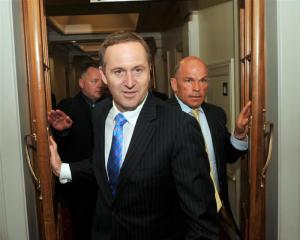Leaders of the six minor parties in Parliament last night auditioned for a job after the next election, but the surprise for voters would have been the closeness of the parties on many issues.
Taking part in the Television New Zealand minor parties leaders' debate were Rodney Hide (Act New Zealand), Peter Dunne (United Future), Jim Anderton (Progressive), Winston Peters (New Zealand First) Tariana Turia (Maori Party) and Jeanette Fitzsimons (Green Party).
Some of those leaders will help form the next government.
Messrs Hide and Dunne had indicated earlier they would only be prepared to work in a National-led government, Mr Anderton and Ms Fitzsimons would only work in a Labour-led government, while Mr Peters and Mrs Turia were keeping their options open.
Mr Peters has been ruled out of post-election deals by National leader John Key, but that did not prevent him from saying that after election day Mr Key would talk to anyone if it meant forming a government.
A blanket could have been thrown over policies on several issues, including lifting children out of poverty, raising the minimum wage, alleviating the effects of the global economic crisis, and restorative justice.
Only Act leader Rodney Hide stood out from the pack on law and order, insisting that his bottom-line was "three strikes and you're out" for violent criminals, although he adopted a softer line on children's reading, writing and numeracy needs, which were priorities for all leaders.
Mrs Turia was coy over whether she would work with either National or Labour, although moderator Mark Sainsbury did tease out of her that entrenching the Maori seats was a bottom-line for the party.
She later said the preferred coalition partner had to agree to the Private Members Bill entrenching the seats being introduced to Parliament.
Mr Hide and Ms Fitzsimons supported retaining the Maori seats.
Messrs Peters and Dunne did not.
Mr Anderton was not asked directly.
Mr Hide ruled out sitting at a Cabinet table if Mr Key went back on his word and asked Mr Peters to help form the government.
Ms Fitzsimons said she would have difficulty working with Mr Peters in Cabinet while a police investigation was under way, but she had no problems with NZ First supporting a government with confidence and supply agreements.
Mr Anderton, who is Agriculture Minister, was happy to sit in Cabinet again with Mr Peters, saying the NZ First leader had done a good job as Foreign Affairs Minister.
Mr Peters said the severity of the financial crisis meant he could work with anyone.
Prime Minister Helen Clark would have taken some heart from the debate, with four of the six leaders indicating they could work with her, and only two, Messrs Hide and Dunne, ruling her out.
When asked, Mrs Turia said she got on well with everyone in Parliament.
Mr Key will now need to think carefully about how he treats major policies for Maori, particularly as polling indicates the party will win all seven Maori seats.
Policies include entrenching the Maori seats, lifting children out of poverty, getting rid of the dole, raising the minimum wage to $15 an hour and reducing the number of young Maori men in prison.







